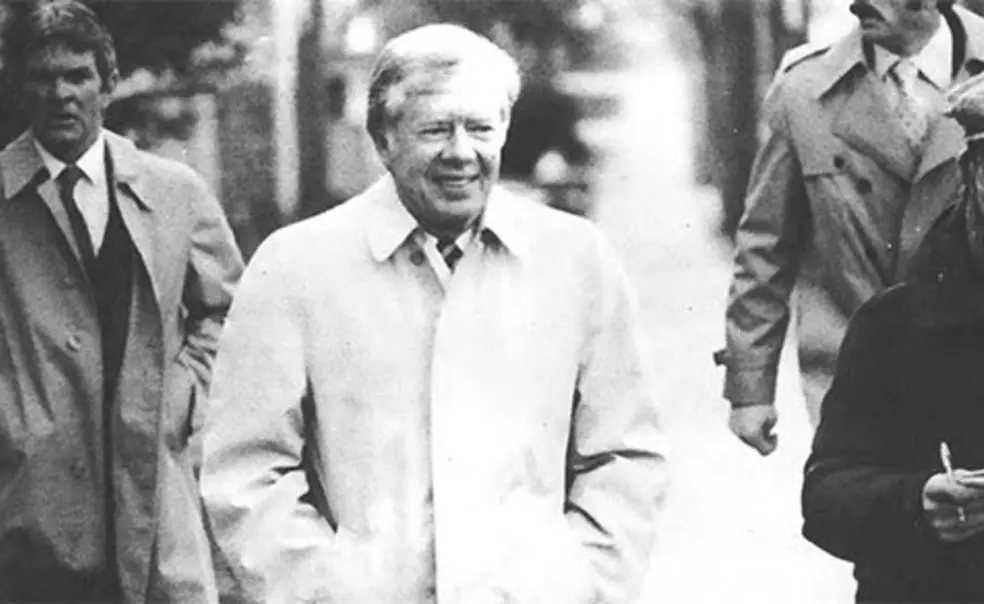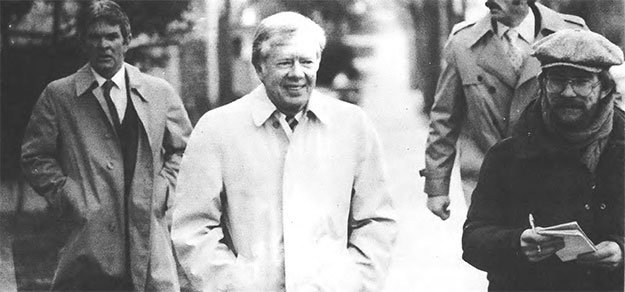Looking Back: Jimmy Carter’s 1981 Visit to Princeton
It was a chilly spring day 33 years ago, and Jimmy Carter was in town. His visit, PAW wrote, “turned the campus into a carnival.”
How so? That morning, 500 students waited outside the Wilson School for Carter’s 11 a.m. arrival, the Daily Princetonian reported. National media outlets were there, too.
Sixty students, selected after a competitive process — they had to have taken one of seven courses, and been nominated by the professor — were soon to meet the former president in a question-and-answer session.
Earlier that morning, Carter had gone for a brisk stroll through Princeton campus (he would have gone jogging, but had forgotten to pack his running shoes). Only two Secret Service agents accompanied Carter, and anyone able to keep pace could talk to him privately.
Kirk Petersen ’80, who had graduated the previous year and was working as a cub reporter for the Home News (now part of the Home News Tribune), managed to snag an exclusive interview with Carter and took the former president on a tour of campus.
They walked through FitzRandolph Gate and passed by Nassau Hall.
“I can’t remember whether I had the presence of mind to tell him that Nassau Hall briefly was the seat of the fledgling United States government during the Revolutionary War,” Petersen later recalled in his blog. “I do remember telling him, in my role as tour guide, that ‘these are mostly dormitories’ around us. I think I said that twice.”
Petersen was also surprised that the Secret Service agents didn’t so much as frisk him, or even ask him to open his coat.
“I was star-struck,” Petersen said. “I was walking next to a man who just two to three months ago was the President of the United States.”
As Carter walked through campus, other students also took the opportunity to speak to the former president, including Alison L. Cowan ’82, who now writes for The New York Times.
On Dec. 3, Carter — now 90 years old — will again visit the University. He will be speaking at the University Chapel about his new book, A Call to Action: Women, Religion, Violence, and Power, which deals with the questions of challenges to women’s rights in cultures around the world.
For the record: An earlier version of this story erroneously stated that the Home News is no longer published. The newspaper is now part of the Home News Tribune.
READ MORE: Todd Purdum ’82’s On the Campus column about Carter’s visit, below.
On the Campus: Covering Carter’s Visit
By Todd Purdum ’82
Originally published in the April 6, 1981, issue.
Normally, the week between midterm exams and spring vacation is a quiet one at Princeton. But for two days last month former President Jimmy Carter’s visit turned the campus into a carnival. It did not bring out the best in either those who handled the arrangements or those of us who tried to cover the event for the national media.
For Carter, who is working on his memoirs, the main point of the trip was to consult with scholars like Fred I. Greenstein, Arthur S. Link, and Robert J. Donovan about that project and other matters such as the organization of his Presidential library. He also was scheduled to conduct a private “town meeting”-style question and answer session with some 70 selected students and faculty at the Wilson School. But his only public appearance was to be a brief “photo opportunity” as he entered the building; there were no formal meetings with the press.
This compromise between a public and private event was struck, at least in part, because Carter’s staff was reluctant to have him speaking for the record so soon after his successor’s inauguration. But there was an element of coyness in their obvious desire to have both national publicity and built-in deniability of any controversial remarks the former President might make.
The Wilson School, which had originally sought a session open to everyone, went along, establishing criteria for students who wished to attend-membership in one of seven courses and nomination by the professor. But then, in at least three cases, it proceeded to break its own rules.
Once Carter’s schedule was announced, the media began maneuvering to get someone inside. As Princeton’s stringer for the New York Times, this reporter was caught in the middle. Editors at theTimes called the Wilson School, the university’s Communications Office, and even President Bowen’s office in an attempt to weasel me into the closed sessions, implying that failure to cooperate could jeopardize Princeton’s future relationship with the paper. Several campus reporters received phone calls from an alumna in the Class of ’76 who is a producer for a national network. She wanted a student to record the meeting or take notes. Eventually she found a willing pawn and shelled out a handsome sum for an exclusive to his handwritten notes.
Carter arrived in Princeton, with police escort, late in the afternoon and went directly to Palmer House, the university’s guest residence on Bayard Lane, where he met with a group of professors. Then he crossed the street to Morven, where he dined with one of his early supporters, Governor Brendan T. Byrne ’47, and Ferris Professor of Journalism John McPhee ’53, whom he had met while Governor of Georgia. Both acted as witnesses that night when Carter signed a contract with Bantam Books for the publication of his memoirs, which he hopes to finish in a year.
Shortly before 7 a.m. the next day, Carter stepped out of Palmer House for a morning stroll. He was met by only two photographers and one reporter, Kirk Petersen ’80 of the New Brunswick Home News, who guided him on a tour of the campus. Two students came up to him in running suits and told the former President they had hoped to go jogging with him. Carter lamented that he had forgotten to bring his running shoes with him. In response to another student’s question, he said he considered Princeton “a good place” when it came time for his daughter, Amy, to apply for college.
The calm of his early walk through campus stood in stark contrast to the crush when his party arrived at the Wilson School shortly before noon. One New York anchorwoman, watching Carter’s limousine approach, was heard to warn, “Get ready for the gang-bang,” as she started elbowing her way through the crowd.
Among the students admitted to the session were a Press Club member, the chairman of the Daily Princetonian, and a WPRB staffer. Before the meeting, Vice President for Public Affairs Robert K. Durkee ’69 informed them there was to be no “first-hand” reporting, but they were free to discuss what was said with campus or outside media. Because of this admonition, and because a Carter press representative told me direct quotation would be inappropriate, I and my fellow stringers decided to report the story by paraphrasing Carter’s remarks as gleaned from students who were there.
Soon after the hour-long session ended, an Associated Press dispatch, rewritten from such second-hand reports, was flashing across the country. Its heavily edited lead paragraph carried several misrepresentations of fact. Subsequently, the stringer who had attended the meeting was persuaded by his editors that it was his duty to print direct quotations from Carter’s remarks. ThePrince made a similar decision.
So the world learned that Carter felt the Democratic party had been an “albatross” around his neck during his reelection campaign, and that he favored a single six-year term because it would enable a President to pursue policies without being accused of doing things for political gain. He said he didn’t think there was much he could have done differently during his term, but he acknowledged that he had failed to rally public opinion behind his initiatives, and he blamed much of his failure on institutional difficulties impeding the Presidency. At the same time, he criticized both Congress for its “lethargy” and the press for its “irresponsibility.” Yet for lack of direct quotations, my Times story shrank from a 600-word dispatch to a mere six-paragraph item in “Notes on People.”
Following the session, Carter joined President Bowen for lunch at Lowrie House. Then his Princeton visit concluded with a tour of the Plasma Physics Laboratory at Forrestal. “If we can be successful in these experiments in fusion power, it will open up a great avenue. No one is better qualified than the people at Princeton,” he said as he left.
After two days of watching reporters scramble, push people around, and bend the rules, most of my shiny ideals about the media had been badly tarnished. If Carter’s visit proved anything, it was that no one group or institution has a monopoly on virtue. During his stroll around campus, the former President had mentioned that his daughter, Amy, was interested in either law or journalism. “I don’t know which would be worse,” he grinned. I used to think I did. Now I am not so sure.













No responses yet